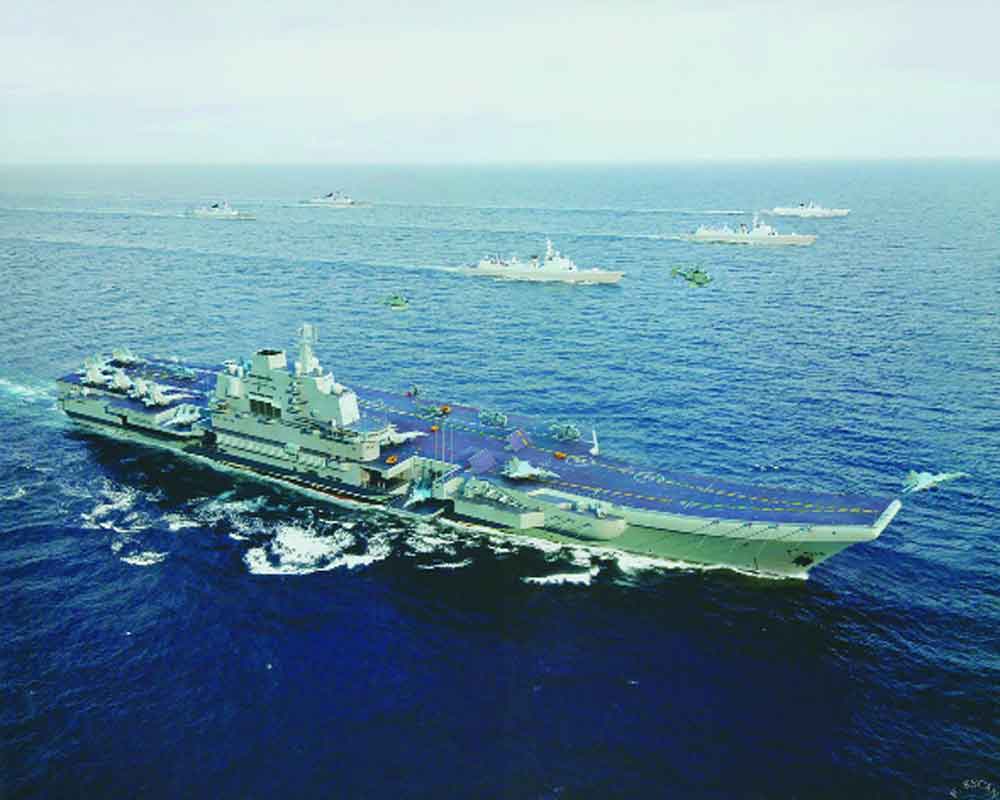Through initiatives like the Belt and Road Initiative and the String of Pearls strategy, China aims to extend its maritime influence, raising questions about its long-term objectives
China's expansive push into larger maritime domains has emerged as a significant global concern. This is particularly evident in its construction and takeover of maritime infrastructure across strategic locations, most prominently in the Indian Ocean Region (IOR), the South China Sea, and the largely Indo-Pacific. The surge in its naval activities, along with the aggressive acquisition of vital maritime assets beyond its strategic limits, has compelled nations to dissect Beijing’s long-term expansive objectives.
China’s intention: China’s much-calculated ambitious plans for maritime expansion are evident, particularly when examining the modus operandi of its Belt and Road Initiative (BRI) investments. These investments aim at enhancing China’s maritime reach and linkages in all directions, which go hand in hand “by the intent of crafting a global power imbalance." Much attached to this intention is its String of Pearls strategy - which is aimed at encircling and containing the littoral South Asian countries and dictating their maritime trade and naval support networks.
Littoral States into Client States: Amongst its expansion motifs into South Asia, the transformation of the small states into client states remains the foremost- of late Maldives has fallen into this trap. Concern remains, as the latter will act as a buffer zone around India’s maritime strategic space and serve China’s naval expansion in the IOR.
Maritime infrastructure: In the IOR, China is doing extra-territorial heavy investments into maritime infra. The intention is to take over others’ critical assets while tactically positioning itself in crucial maritime zones. To further its access and reach to others’ maritime zones that once remained distant is now getting closer to China using the creation of support networks in the littoral states through diverse investments.
Global Stability: The implications of China’s maritime goals, particularly infrastructure control, require further examination. China’s hybrid strategy of expanding its naval growth and infrastructure acquisition demonstrates its ambition to reshape the global maritime landscape to its capacious encroachments. China’s proactive acquisition of marine infrastructure, especially in the IOR, has become a major contention in global geopolitics.
China intends to gain control of critical marine infrastructure via a variety of initiatives. Several naval projects have been proposed, including port expansion, drone submarines, air-to-air refuelling, specialised missile systems, carrier-based stealth aircraft, and underwater drones. The intention, beyond doubt, is to bring its naval force to a formidable presence by keeping control over critical maritime infrastructure.
The Response: In response to China’s extraterritorial garnishment, global players must urgently devise a comprehensive plan. The major stakeholders must come to the interest of the small littoral States. The focus should be on countering China’s strategic procurement and control over the maritime expanse and infra in these contested regions.
The role of India: as the Net Security Provider in the region, India must have a long-term underpinned perspective - that keeps the potential consequence of China’s escalating expansion - clear spelt. By remaining aligned with these perspectives, India can make the major players critically aware of the Chinese motives and align them with the task. The singular agenda must be, by remaining adhered to the established maritime laws and conventions, there must be a coordinated and proactive response arrangement put into action before the IOR region exasperates into a conflict zone.
Alternative Supply Chain : As nations cope with the escalating challenges posed by China’s maritime motives that centre on infrastructure control, a united front to contain this must be imperative. Countries must push back against the BRI; and, alternatives to the BRI, such as Japan’s “Asia-Africa Growth Corridor “ and “India’s Security and Growth for All” must be pursued as alternatives. While Australia, the EU, Indonesia, Japan, and the U.S. are implementing strategies to counterbalance China’s maritime ambitions, India’s effort must be to bring them to these alternative initiatives and collaborate with them to the realisation of a full-scale "Alternative Global Supply chain Alliance"-keeping in attention both the civilian and military purpose.
Multi-modal partnership mechanism: Global cooperation is essential to contain China’s assertion and control over extra-territorial maritime zones and infrastructures. Further to contain its ulterior expansion motives, vigilance in maritime affairs must be consolidated.
Necessary multi-modal-partnership mechanisms must be in place to protect the critical maritime infrastructures, assets and activities, where India can play a key role.
India, while maintaining its strategic autonomy also needs to cooperate with non-residential maritime powers to cultivate the required response considerations. To the effectiveness of the multilateral security framework in place; things like diplomatic initiatives, military strategies, supply chain initiatives and multilateral cooperation must remain pivotal.
Net Security Provider: To carefully achieve this, measures to demystify the complexities presented by China’s assertive projection, providing better alternatives with a non-zero-sum partnership platform for the aggrieved nations, must be India’s priority.
(The writer works with an independent think tank; Views are personal)


























